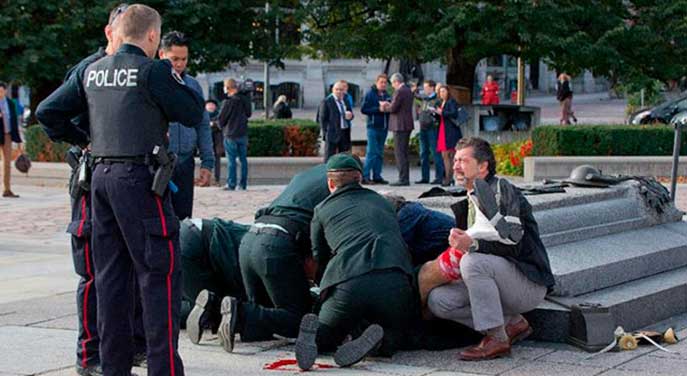 Many arguments were used to justify calls for the use of the Emergencies Act. In order to bolster the claim that the traffic jam in downtown Ottawa constituted a threat to national security, Emergency Preparedness Minister Bill Blair insisted the truckers’ convoy was “a largely foreign-funded, targeted and coordinated attack … to harm Canada.” Public Safety Minister Marco Mendicino spoke of “a very small, organized group, driven by an ideology to overthrow the government through whatever means they may wish to use.”
Many arguments were used to justify calls for the use of the Emergencies Act. In order to bolster the claim that the traffic jam in downtown Ottawa constituted a threat to national security, Emergency Preparedness Minister Bill Blair insisted the truckers’ convoy was “a largely foreign-funded, targeted and coordinated attack … to harm Canada.” Public Safety Minister Marco Mendicino spoke of “a very small, organized group, driven by an ideology to overthrow the government through whatever means they may wish to use.”
Jagmeet Singh and the NDP, doing their best to disavow the examples of their ideological forefathers like Tommy Douglas or J.S. Woodsworth, averred that the truck convoy meant to disrupt democracy itself: “They came here to overthrow a democratically elected government,” cried Singh.
Betraying his ignorance of what democracy actually means, Liberal MP Ysir Naqvi complained that “hurtful and racist symbols were everywhere!” and noted that outdoor urination had been observed.
Betraying an ignorance of what an acronym is, another Liberal MP, Ya’ara Saks, asked, “How much vitriol do we have to see of ‘honk honk,’ which is a new acronym of ‘Heil Hitler’”?
Interestingly, none of these specious reasons were included in the official Proclamation Declaring a Public Order Emergency, which may be found online and which makes for interesting reading.
If our cabinet honestly thought that blockades were security threats, it would have acted in the past few years to remove Indigenous and ecological activists from their perches on rail lines and pipelines. If public urination were a reason to invoke the Emergencies Act, all of our inner-city homeless would have been arrested by black-clad RCMP SWAT teams and denied bail. If foreign funding were truly an issue, the flood of American money to Canadian movements to suppress our western oil industry would have resulted in frozen bank accounts and government threats to those donating to environmental groups.
To put things into context, let us remember that there have been times in Canadian history when our Parliament was genuinely under attack. The 2014 assault by an Islamic terrorist that killed a ceremonial guard and ended in a shoot-out in the Hall of Honour itself comes immediately to mind. In 2006 police arrested 18 Islamic extremists for planning to blow up the Toronto Stock Exchange and the Parliament buildings. In 1966 a deluded Paul Chartier, who envisioned himself to soon be the “President of Canada,” brought a dynamite bomb to Parliament with the intent of hurling it into the House of Commons from the visitor’s gallery. He wished to murder as many MPs as he could but the device exploded prematurely and he was killed in a washroom. In 1868, MP Thomas Darcy McGee was walking home from Parliament when he was assassinated by a Fenian terrorist.
None of these attacks resulted in a proclamation suspending civil liberties and punishing people for donating money to a cause they supported. There was no round-up of Canadian Muslims in 2006 or 2014; no mentally ill people with a grievance were arrested in 1966; no Irish immigrants harbouring anti-British sentiments were interned in 1868.
Though the government eventually came to its senses, utilizing the Emergencies Act is itself a profoundly undemocratic action. It should be used only in the direst of circumstances.
Gerry Bowler is a senior fellow at the Frontier Centre for Public Policy.
Gerry is a Troy Media Thought Leader. For interview requests, click here.
The opinions expressed by our columnists and contributors are theirs alone and do not inherently or expressly reflect the views of our publication.
© Troy Media
Troy Media is an editorial content provider to media outlets and its own hosted community news outlets across Canada.


